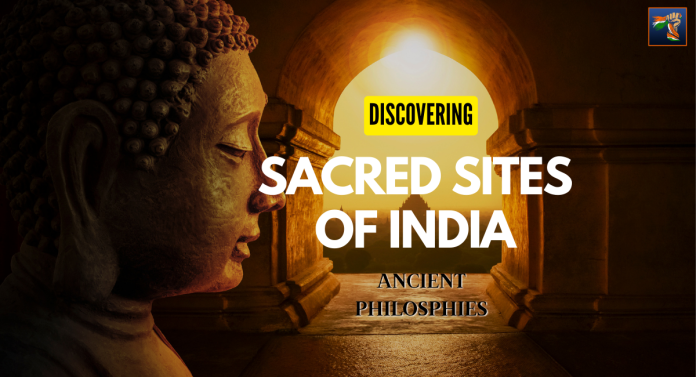Today it’s about discovering the ancient philosophies and sacred sites of India. India has long been a cradle of ancient philosophies and spiritual traditions that have influenced the world. From the profound philosophies of Hinduism, Buddhism, and Jainism to the sacred sites that resonate with spiritual energy, the country offers a captivating journey for seekers of inner knowledge.
In this article, we will embark on a spiritual exploration, delving into the rich philosophies and visiting sacred sites such as Varanasi, the temples of Khajuraho, and the serene landscapes of Rishikesh, unveiling India’s profound spiritual significance.
- Hinduism: Hinduism, one of the oldest religions in the world, encompasses a diverse range of beliefs and practices. Its philosophies, as outlined in texts such as the Vedas and Upanishads, explore the concepts of karma, dharma, and moksha (liberation). The sacred city of Varanasi, situated on the banks of the River Ganges, is regarded as one of the holiest places in Hinduism. Pilgrims flock to Varanasi to cleanse their sins, perform rituals, and immerse themselves in the spiritual atmosphere.
- Buddhism: Originating in ancient India, Buddhism is centered on the teachings of Siddhartha Gautama, known as the Buddha. The principles of Buddhism revolve around the Four Noble Truths and the Eightfold Path, offering a path to enlightenment and liberation from suffering. The city of Bodh Gaya holds immense significance for Buddhists as it is believed to be the site where the Buddha attained enlightenment under the Bodhi tree. The Mahabodhi Temple in Bodh Gaya serves as a focal point for Buddhist pilgrims from around the world.
- Jainism: Jainism, founded by Mahavira, emphasizes non-violence (ahimsa), truth, and compassion. It promotes the idea of freeing one’s soul from the cycle of birth and death through ascetic practices and righteous living. The ancient city of Palitana in Gujarat is a revered pilgrimage site for Jains. It is home to Shatrunjaya Hill, where thousands of intricately carved Jain temples stand as a testament to the faith and devotion of Jain followers.
- Varanasi: Varanasi, also known as Kashi, is an embodiment of spiritual energy and a revered place for Hindus. Pilgrims flock to the ghats (steps leading to the river) of the Ganges to perform sacred rituals, offer prayers, and immerse themselves in the cycle of life and death. The mesmerizing evening Aarti ceremony, where lamps are lit and devotional hymns are sung, is a powerful and soul-stirring experience.
- Khajuraho Temples: The temples of Khajuraho, located in Madhya Pradesh, are renowned for their intricate and erotic sculptures. Built by the Chandela dynasty between the 9th and 11th centuries, these temples represent a blend of Hindu and Jain architectural styles. Despite the erotic art, the temples also depict various aspects of daily life, spiritual teachings, and divine deities, showcasing the balance between sensuality and spirituality.
- Rishikesh: Nestled in the foothills of the Himalayas, Rishikesh is a serene and tranquil destination that has drawn spiritual seekers for centuries. Known as the Yoga Capital of the World, Rishikesh offers a peaceful environment for meditation, self-reflection, and spiritual growth. The sacred River Ganges flows through the town, and the famous suspension bridge, Ram Jhula, is a popular spot for seekers to contemplate and connect with their inner selves.
Conclusion:
India’s ancient philosophies and sacred sites provide a profound and transformative experience for those seeking spiritual enlightenment. From the philosophical depths of Hinduism, Buddhism, and Jainism to the sacred cities of Varanasi and Bodh Gaya, each destination offers a unique perspective on spirituality.
The temples of Khajuraho and the serene landscapes of Rishikesh further enhance the spiritual significance of India. By delving into these ancient philosophies and visiting these sacred sites, one can embark on a transformative journey that unveils the spiritual essence and cultural richness of the country.













[…] Discovering the Ancient Philosophies and Sacred Sites of India […]